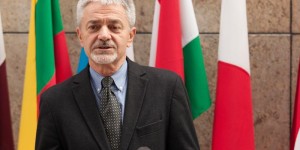“Distinguished members of the Igman Initiative, your Excellences, members of the parliaments, dear colleagues and friends, thank you for the invitation to speak today to reflect on Bosnia and Herzegovina’s European perspective, twenty years after the Dayton Peace agreement.
Today gives us an opportunity to look back and assess the progress BiH has made since Dayton. But, equally important, it gives us an opportunity to look forward. Moving the country from “Dayton to Brussels” has been our collective goal over the past decade and more. As most of you in the room know, it has been a difficult journey so far and the road ahead is neither straight nor easy and it is important to acknowledge that. There are some obstacles waiting for us along the way.
But, we believe that the destination remains clear. Our commitment to Bosnia and Herzegovina’s membership in the European Union is firm and EU membership is a policy goal shared by all of the country’s politicians and – most importantly – by the overwhelming majority of citizens in this country.
Unfortunately, Bosnia’s EU journey has been stalled for many years. Failure of the parties to agree on constitutional changes to give equal rights to individuals who do not identify with any of the country’s three “constituent” national groups – implementation of the Sejdic-Finci decision – was a major stumbling block. But we also saw lack of political will blocking a number of other issues critical for further EU integration.
Meanwhile, as Bosnia stagnated, its neighbours continued to progress on their European paths, with Croatia joining the Union in 2013 and Serbia gaining EU candidate status in 2012. Membership negotiations with Serbia opened in January of last year.
Recognizing the urgent need to get Bosnia back on its European track, a new approach was designed by the European Council last December. In response, the institutions and political leaders in BiH committed to further reforms on BiH’s EU path in February and the European Union took the decision to bring the Stabilisation and Association Agreement into force in April. This was a defining moment for relations between the EU and Bosnia and Herzegovina, and sets the country firmly on an EU accession path.
The BiH authorities also adopted an ambitious Reform Agenda over the summer, containing a set of concrete socio-economic and other reforms that will kick-start the ailing economy and create jobs and investments. The implementation of many aspects of the reform agenda is progressing, and we need now to see maintenance of this momentum and an intensification of efforts.
These reforms are designed to ensure that in the meantime the country addresses and solves it’s most prevailing socio-economic problems.
But, all this does not mean that the EU has changed the principles of enlargement policy to suit BiH. EU accession criteria remain unchanged, and must be met to become EU member. What has changed is that we are now focussing firmly on reforms that cannot easily be dismissed by politicians as matters that impinge on the “vital national interest” of their ethnic group. These are ambitious structural reforms that are urgently needed to improve the country’s finances, attract investment and create jobs. They cannot be dismissed or rejected by playing narrow ethnic politics.
We do recognize, of course, that deep reform of the country’s institutions will be required to enable better service to citizens and to meet the requirements of integration into the EU. Many believe that BiH needs constitutional reform before real change will happen. We are all aware that the cumbersome layers of government put in place at Dayton need reform. Bosnia and Herzegovina will certainly need to make changes to its constitution during the process of conforming to EU legislation, just like every other acceding country has done. But, we believe that improvements to the economy, public administration and rule of law are most pressing and most likely to gain cross-party support.
However, becoming a member of the EU family is not just about complying with the EU acquis. It is also about making the country economically fit for membership to make sure that the candidate country can reap the full benefits of EU accession. This requires reforms that improve the business environment, making investment easier and more profitable.
The country needs internal stability, and internal stability ultimately depends on the preparedness of politicians to cooperate and create a stable and fertile climate for investment. We are concerned by some recent developments. The recent decision of the RS Government to suspend cooperation with certain judiciary and law enforcement agencies could jeopardise the functioning of the judiciary and law enforcement in BiH. It is hard to see how a country characterised by instability and problematic judiciary can prosper and successfully become an EU member.
I frankly doubt that what the country needs are debates about referenda or polemic arguments between different political parties and levels of government on who is the bigger defender of national interests. What we need is economic growth, creating employment, economic reforms, cooperation. And it is up to politicians to create the climate for this.
The BiH authorities have outlined an ambitious timeframe for submission of a membership application. We have said with clarity that for a membership application to be assessed as credible, there needs to be meaningful progress in the implementation of the Reform Agenda. There also needs to be progress on trade adaptation in respect of the Stabilisation and Association Agreement, and a functioning co-ordination mechanism that ensures balanced and efficient decision-making on matters concerning the integration process. The political fog would need to clear too, and the country must show that it is able to stand in its feet and make progress. I would really like to urge all to get on with the task in hand, and not to lose momentum.
Future EU membership is within BiH’s reach. But an enormous amount of work needs to be done to transform the way the country works at the moment.
The EU accession process will not solve every problem in the country, but we believe that locking the country into a process of membership negotiations will enable reforms that are essential for economic growth, more stable and functional institutions, and – ultimately – long-term peace and reconciliation.
Ladies and Gentlemen,
Once again, thank you for inviting me to speak at this important event, and let me emphasize once again that with a clear strategic vision, consistent action and the support of all political forces, BiH’s EU perspective is realistic and can be achieved. And we will continue to offer the European Union’s full support along the way.
Thank you.”
Dr Renzo Daviddi, Deputy Head of Delegation of the EU, spoke at the 25th session of Igman Initiative “Dayton and the Region – 20 years later – Further Perspectives of Western Balkans – 15 years of Igman Initiative “, in the Parliamentary Assembly of BiH on 12 December 2015.


